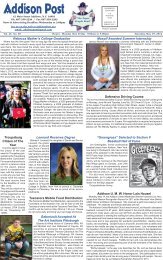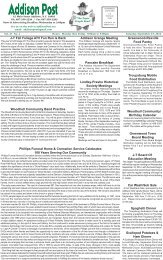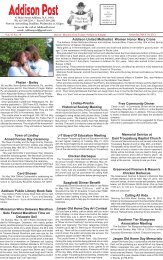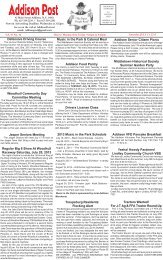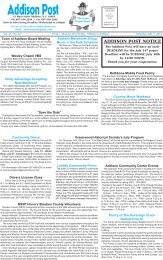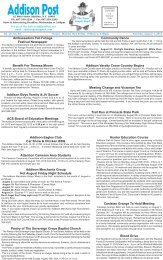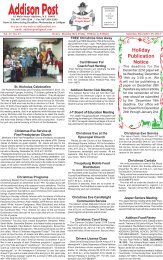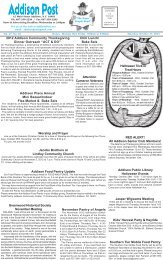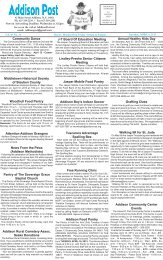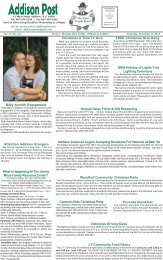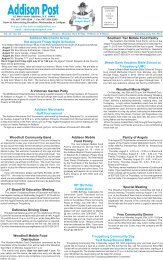Create successful ePaper yourself
Turn your PDF publications into a flip-book with our unique Google optimized e-Paper software.
ADDISON POST Saturday, APRIL 13, 2013 Page 6<br />
Dear Parents and students:<br />
School Year 2012-2013 Issue 31 Page 3 of 5 April 12, 2013<br />
The new Common Core Standards play a crucial role in helping us ensure that all of New York's students graduate<br />
from high school with the skills and knowledge necessary to succeed in college and careers. As we prepare<br />
students in grades 3-8 to take the first Common Core state tests this month, we are continuing our efforts<br />
to communicate directly to parents about the changes to the tests and what those changes will mean for students.<br />
The new tests will reflect the Common Core Standards, so the tests will be more challenging. Students will be<br />
asked to read more difficult texts, to use evidence to support their arguments, and to perform multiple-step<br />
math problems. The number of students meeting or exceeding Common Core grade-level expectations should<br />
not be interpreted as a decline in student learning or a decline in educator performance. The results from these<br />
new assessments will give educators, parents, policymakers, and the public a more realistic picture of where<br />
students are on their path to being well-prepared for the world that awaits them after they graduate from high<br />
school.<br />
Research has consistently demonstrated that students perform best on local, regional, statewide, or national<br />
assessments when they have a great teacher delivering high quality instruction aligned to rigorous standards.<br />
Rote test prep practices are incompatible with highly effective teaching and lead to lower student performance.<br />
Changes to NYSED Grades 3-8 ELA and Math Tests: Assessing the Common Core<br />
Beginning with the current school year (2012-13), NYSED is re-designing its assessment program (http://<br />
engageny.org/resource/common-core implementation-timeline) to measure what students know and can do<br />
relative to the grade-level Common Core State Standards. Specific changes to the Grades 3-8 ELA and math<br />
tests (http://engageny.org/resource/test-guides-for-english-language-arts-and-mathematics) include the following:<br />
1. Increases in Rigor – The CCSS are back-mapped, grade-by-grade, from college and career readiness.<br />
Many of the questions on the Common Core assessments are more advanced and complex than those found<br />
on prior assessments that measured prior grade-level standards.<br />
2. Focus on Text – To answer ELA questions correctly, students will need to read and analyze each passage<br />
completely and closely, and be prepared to carefully consider responses to multiple-choice questions. For constructed<br />
response items, students will need to answer questions with evidence gathered from rigorous literature<br />
and informational texts. Some texts will express an author’s point of view, with which not all readers will<br />
agree.<br />
3. Depth of Math – Students will be expected to understand math conceptually, use prerequisite skills with<br />
grade-level math facts, and solve math problems rooted in the real-world, deciding for themselves which formulas<br />
and tools (such as protractors or rulers) to use.<br />
Ensuring College and Career Readiness for All – A Message from the NY State Commissioner of Education<br />
New York’s graduation rates have increased in recent years. Of the public school students who entered ninth<br />
grade in 2007, 74% percent graduated four years later. However, the good news about the rise in the graduation<br />
rate does not tell a full story. Despite New York State having some of the most successful individual districts<br />
and individual schools in the country, too many of our students do not graduate, and too many of our high<br />
school graduates find themselves taking remedial courses when they enter college. These students pay college<br />
tuition for learning that should have happened in high school, and students who take remedial courses in<br />
college are less likely to finish their studies. Students who do not complete post-secondary education often<br />
have to accept jobs that do not provide a family-supporting wage and do not offer potential for meaningful advancement.<br />
This outcome hurts us all – our children, our families, New York, and the nation. When our educational<br />
system fails to prepare so many of our children for success in college and their careers, we are all accountable.<br />
Reform cannot be delayed.<br />
Additionally , we are trying to keep the district’s mission statement front and center and review it often with<br />
staff, students, parents, and community members.<br />
We are proudly committed to excellence in preparing every student to become successful in a global<br />
society through superior, innovative, educational opportunities that provide lifelong learning.<br />
We will continue to work on what “successful” looks like for our students as a whole. Although state assessments<br />
are not the only measure, they are a very visible component and are being redefined to measure readiness<br />
and lifelong learning skills.



